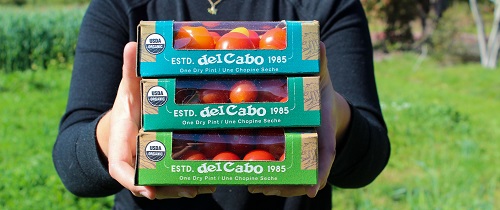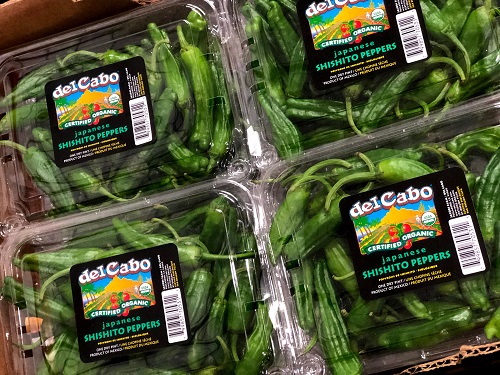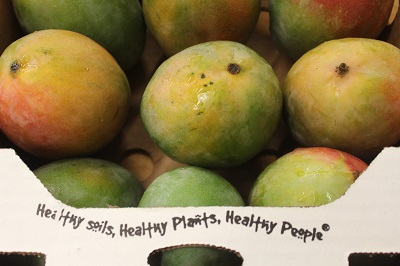Aaron Brookes is director of sales and marketing for Jacobs Farm del Cabo. He joined OPN for a conversation about his company’s organic produce offerings, its new paper-based clamshell packaging, hydroponics in organic ag, and more.
Can you share a little bit about your background in the produce industry?
I have been working in agriculture for 10 years. Following a decade in sporting goods and a short time with startups, I was offered the opportunity to head up marketing and product development for a global fruit and vegetable company. All the pieces lined up, so I jumped on it. Over the last 10 years, I have led sales, marketing, and new product development across a broad range of products, worked in the US and European markets, and engaged with farming communities in North and South America.
 Aaron Brookes, Director of Sales and Marketing, Jacobs Farm del Cabo
Aaron Brookes, Director of Sales and Marketing, Jacobs Farm del Cabo
How long have you been at Jacobs Farm del Cabo, and what led you to work there?
I have been with Jacobs Farm Del Cabo for five years. I was drawn to the company's pioneering history in organic farming, commitment to social responsibility, and the opportunity to help lead the company's next evolution of growth. Jacobs Farm del Cabo is a true mission-driven company, grounded in organic farming, creating economic opportunities for small-scale farmers, and improving the lives of those who have the least. Our purpose is as central today as it was when the company was founded by Larry Jacobs and Sandra Belin in 1980.

What are your company’s commodities and growing locations?
We focus on growing year-round organic tomatoes, peppers, and culinary herbs. Additionally, we grow seasonal offerings like peas, hard squash, and mangos. We work with 1,000+ small and medium-sized family farms stretching from the coastal northern California town of Pescadero down to San Jose del Cabo on the tip of the Baja peninsula. Having this level of geographic diversity allows us to deliver consistent, year-round supply and have a positive impact on countless farm communities from north to south.
"Jacobs Farm del Cabo is a true mission-driven company, grounded in organic farming, creating economic opportunities for small-scale farmers, and improving the lives of those who have the least." -Aaron Brookes
Tell us about Jacobs Farm del Cabo’s growing methods—how much of your produce is grown in open fields versus in greenhouses/hoop houses?
We are traditionally open field organic growers. When we started farming in 1980, coastal California summers were cool and foggy; Cabo winters were dry, and tropical summer storms recharged the aquifers. We now face wildfires, hurricanes, and drought. In the face of climate change, we are moving to more protected growing environments, and this year we launched ClimateLab™, a program that involves data collection, mapping risk, and improving soil health to build a more sustainable and resilient food system. We began initial pilot programs in northern Baja this winter and will be expanding south in the coming months.

What is your customer base, and where is your produce distributed?
Our growth over the past few years has been driven by national retail programs, organic wholesalers, and the emergence of home delivery. We are starting to see a foodservice comeback after a year we would all like to forget, and, as the dust settles, the next generation of retail food and ecommerce startups are beginning to emerge.
"This year we launched ClimateLab™, a program that involves data collection, mapping risk, and improving soil health to build a more sustainable and resilient food system. We began initial pilot programs in northern Baja this winter and will be expanding south in the coming months." -Aaron Brookes
Since we’re approaching the height of Mexican mango season, can you tell us about the del Cabo mango program and what this year’s crop looks like?
Nearly all mangos consumed in the United States are imported from Latin America. In these tropical climates, fruit flies are the primary pest. A common approach to managing this pest is a 115°F hot water treatment and chlorine sanitizer, which decreases flavor, quality, and shelf life.
Our Kent mangos are grown exclusively in Baja California, Mexico, which has been designated pest-free and therefore free from the required hot water treatment for mango export. Our standout, undipped fruit is fully tree-ripened under the desert sun and has a creamy flesh, rich fragrance, and higher sugars. Our mango offering is a limited market favorite that will begin delivering in late July.

Does Jacobs Farm del Cabo have any new product lines, packaging, or areas of expansion that you’d like to share?
We are putting a lot of emphasis on packaging right now and reducing our single-use plastic waste. We just launched a paper-based clamshell alternative that is made with 100-percent-recycled paperboard and a plant-based, home-compostable cellulose window. It has taken some time, but the tension between sustainability, functionality, and price has loosened, leading to an acceleration in new product innovation and the promise of greener alternatives. Moving away from long-established packaging norms can feel like an uphill push, but we have responsibility to make progress here.
"We are putting a lot of emphasis on packaging right now and reducing our single-use plastic waste." -Aaron Brookes
How did Jacobs Farm del Cabo become a plaintiff in the lawsuit challenging USDA’s allowance of hydroponics in organic ag? And can you comment on the March district court ruling (which sided with the USDA) and the appeal of the case to the Ninth Circuit that was just announced last week?
Our founders, Larry Jacobs and Sandra Belin, signed onto the lawsuit. Soil fertility is intimately tied to organic farming. Soil is tied to organic law. The ruling dilutes the organic standard, and we are understandably disappointed —but we are hopeful for a different outcome on appeal.
The National Organic Program was created to establish a USDA-recognized growing practice that produces food without the use of synthetic chemicals (with rare exceptions) while nurturing soil health. We don’t oppose hydroponic production but feel strongly that the organic label was intended to improve soil health. Hydroponic plays a role in our aggregated sustainable farming efforts, but it’s a workaround to resolving soil problems and does nothing to build healthy soil. We believe the organic label should not be diluted by systems that aren’t focused on creating healthy soils.






